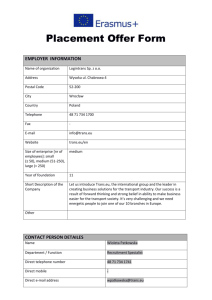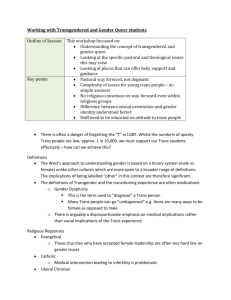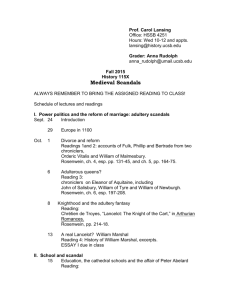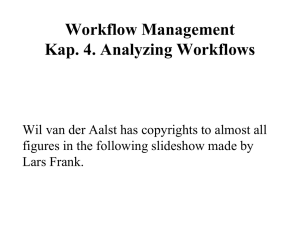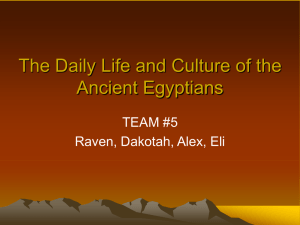Oath-Sworn: The concept of oath-taking in early medieval
advertisement
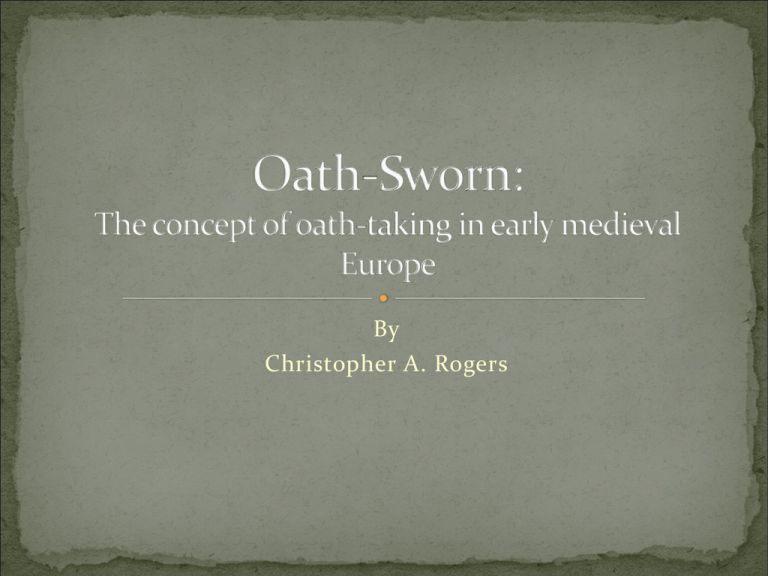
By Christopher A. Rogers “I swear to tell the truth, the whole truth and nothing but the truth, so help me God.” Binding oaths Providing social stability Oaths bound people together to create social stability and were kept through the fear of the gods, legal penalties and one’s own sense of honor. Ordeals – a physical test where God will quickly determine the verdict Compurgation – Swearing oaths with oath-helpers who swore to a litigant’s innocence Guilt determined by the gods, not the people Eventual punishment by the gods Aistulf, King of the Lombards (r. 749-756), smited by God for breaking his oath to Pippin the Short Sworn on sacred items Christians: relic, bible, cross Pagans: weapons, ships Sworn in the name of the gods Self-curse Precise wording Beowulf – bound himself, through oath, to defeat Grendel and defend Hrothgar’s kingdom Oaths of fealty, brotherhood, friendship Bound people to a course of action Created artificial support groups 1-fold, 3-fold, 6-fold, 12-fold 6-fold oath = litigant + 5 oath-helpers (compurgators) More serious crimes needed more compurgators Serious crimes threatened the stability of society Swore not to the truth, but to the belief in innocence Show of support for the litigant by his support groups Temporal punishment needed the will of the people Delegated judgment to the gods Prevented the outbreak of blood feud Physical survival depended on people working together Oath-breaking – breaking an oath Perjury – knowingly swearing a false oath Threatened the stability of society Disdained the fear of gods Real belief that the gods would enforce the terms of the oath Fear of divine punishment How well they were known Currency of medieval life All strove to gain more and often dictated actions Perjury and oath-breaking caused great dishonor Fines for minor oaths broken/perjured Lesser/major outlawry for major oaths broken/perjured Property forfeited, death could not be avenged No longer eligible to clear their name through oaths, must use ordeals Oaths created stability Through bonds and creation of support groups Enforced through legal codes, sense of honor and fear of the gods Compurgation lessened as states became centralized Oaths still integral to modern society Bayerschmidt, Carl F. and Lee M. Hollander trans. Njal’s Saga. London: Wordsworth Classics of World Literature, 1998. Byock, Jesse trans. The Saga of the Volsungs: The Norse Epic of Sigurd the Dragon Slayer. Berkley: University of California Press, 1990. Ferrante, Joan M. trans. Guillaume d’Orange: Four Twelfth-Century Epics. New York: Columbia University Press, 1974. Hudson, Marc trans. Beowulf: A translation and commentary. London: Lewisburg Associated University Press, 1990. Ryder, Frank G. trans. The Song of the Nibelungs. Detroit: Wayne State University Press, 1962. Sisson, C. H. trans. The Song of Roland. Manchester: Carcanet Press, 1983. Terry, Patricia trans. Poems of the Elder Edda. Philadelphia: University of Philadelphia Press, 1990. Ashliman, D. L. University of Pittsburgh’s Folklore and Mythology Texts. http://www.pitt.edu/~dash/folktexts.html Dennis, Andrew and Peter Foote and Richard Perkins trans. The Laws of Early Iceland, Grágás: The Codex Regius of Grágás with material from other manuscripts. Winnipeg: University of Manitoba Press, 1980. Drew, Katherine Fischer trans. The Laws of the Salian Franks. Philadelphia: University of Pennsylvania Press, 1991. -------------. The Lombard Laws. Philadelphia: University of Pennsylvania Press, 1973. Larsen, Laurence M. trans. The Earliest Norwegian Laws: Being the Gulathing Law and the Frostathing Law. New York: Columbia University Press, 1935. Cross, Samuel Hazzard and Olgerd P. Shebowitz-Wetzon trans. The Russian Primary Chronicle: Laurentian Text. Cambridge: The Mediaeval Academy of America, 1953. Finlay, Alison trans. Fagrskinna, a Catalogue of the Kings of Norway. Northern world, v. 7. Leiden: Brill, 2004. Nelson, Janet L. trans. The Annals of St. Bertine. Vol. I of Ninth Century Histories. Manchester: Manchester University Press, 1991. Reuter, Timothy trans. The Annals of Fulda. Vol. II of Ninth Century Histories. Manchester: Manchester University Press, 1992. Scholz, Bernhard Walter trans. Carolingian Chronicles: ‘Royal Frankish Annals’ and Nithard’s ‘Histories.’ Ann Arbor: University of Michigan Press, 1970.
